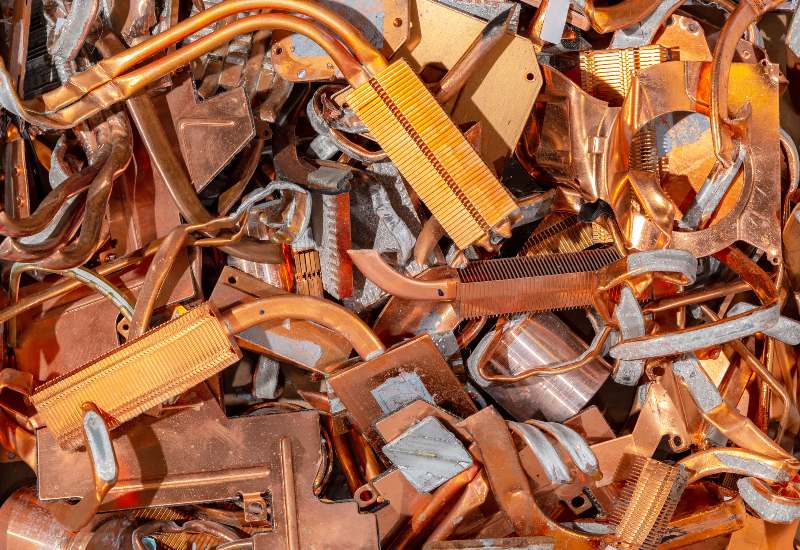Reasons to Recycle Your Copper
Reasons to Recycle Your Copper in Vancouver
Copper recycling involves the process of collecting and processing scrap copper and reclaimed copper-containing materials to recover the copper metal for future use. Copper is a highly valuable material used in various applications because of its excellent conductivity, durability, and recyclability.
Let’s explore what exactly goes into the process of recycling copper:
- Collection: This step involves gathering copper waste from various sources, including construction sites, electrical and electronic equipment, plumbing pipes and fittings, and industrial machinery.
- Sorting and Separation: Once collected, the scrap is sorted based on its copper content. High-quality copper scrap, like clean electrical wires or plumbing pipes, is separated from lower-quality scrap that may be mixed with other materials or coatings.
- Cleaning: The sorted copper scrap is then cleaned of any insulation, paint, or other coatings that might be present on the surface. This is especially important for wire, which often has an insulation layer that needs to be stripped away.
- Shredding and Crushing: The clean scrap copper is then shredded or crushed to prepare it for further processing. This step increases the surface area of the metal, making it easier to melt.
- Melting: The shredded or crushed copper scrap is melted in a furnace. The melting process is carefully controlled to maintain the quality of the copper. Depending on the purity of the scrap, various refining processes may also be applied to remove impurities.
- Purification: To ensure the highest quality copper, the molten metal may undergo several purification processes. This can include electrolysis, which uses an electrical current to refine the metal further.
- Solidification: After purification, the molten copper is poured into molds where it solidifies into ingots, bars, or other shapes. These forms can then be used as raw material in the production of new copper products.
- Fabrication: The recycled copper is then fabricated into new copper products, ranging from electrical wires and plumbing tubes to electronics and automotive components.
Copper can be recycled almost indefinitely without losing its properties or quality, making it a highly sustainable material. Recycling copper not only conserves the copper resources but also saves a significant amount of energy compared to producing new copper from ore. It also reduces CO2 emissions and the environmental impact of mining and processing activities.

Why is it better to Recycle Copper?
Recycling copper is a win-win for the environment, economy, and society. It conserves natural resources, saves energy, reduces greenhouse gas emissions, supports economic growth, and contributes to the sustainable management of a valuable material. Recycling copper is beneficial for several key reasons:
- Energy Efficiency: Recycling copper uses significantly less energy compared to extracting and refining new copper from ore. It’s estimated that recycling copper saves up to 85% of the energy needed for primary production. This significant energy saving translates into reduced greenhouse gas emissions and a smaller environmental footprint.
- Resource Preservation: Copper is a finite resource, and recycling helps conserve the remaining deposits. By recycling, we extend the life span of the existing copper resources and reduce the need for mining, which is often environmentally destructive.
- Economic Benefits: Recycling copper supports a thriving recycling industry, creating jobs in collection, processing, and recycling facilities. It also helps reduce the cost of copper, which is crucial for many industries, including construction and electronics, due to the reduced energy expenditure and mining costs.
- Waste Reduction: Recycling helps reduce the amount of waste sent to landfills and incinerators. Copper is highly durable and can be recycled indefinitely without losing its quality or properties, making it an ideal candidate for recycling rather than disposal.
- Environmental Protection: Mining activities for copper can lead to environmental degradation through soil erosion, water pollution, and habitat destruction. Recycling copper minimizes the environmental impact associated with mining by reducing the demand for copper extraction.
- Improved Energy Security: By reducing the need for energy-intensive processes associated with mining and processing new copper, recycling contributes to greater energy security. It lessens the dependency on fossil fuels and the associated geopolitical and economic issues.
Contact North Star Metal Recycling Today to Get Started
If you are interested in learning more about copper recycling or to get started, contact North Star Metal Recycling. North Star Metal Recycling has been Metro Vancouver’s trusted choice for metal recycling, purchasing, and sales since 1950. We offer the best metal and copper prices in our area based on current fair market values, which fluctuate daily. We weigh everything right in front of you on a precise digital scale and pay top dollar. Put money in your pocket and keep waste out of our local landfills by trusting your metal recycling to North Star Metal Recycling.
